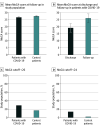Neuropsychiatric and Cognitive Outcomes in Patients 6 Months After COVID-19 Requiring Hospitalization Compared With Matched Control Patients Hospitalized for Non-COVID-19 Illness
- PMID: 35319743
- PMCID: PMC8943626
- DOI: 10.1001/jamapsychiatry.2022.0284
Neuropsychiatric and Cognitive Outcomes in Patients 6 Months After COVID-19 Requiring Hospitalization Compared With Matched Control Patients Hospitalized for Non-COVID-19 Illness
Abstract
Importance: Prolonged neuropsychiatric and cognitive symptoms are increasingly reported in patients after COVID-19, but studies with well-matched controls are lacking.
Objective: To investigate cognitive impairment, neuropsychiatric diagnoses, and symptoms in survivors of COVID-19 compared with patients hospitalized for non-COVID-19 illness.
Design, setting, and participants: This prospective case-control study from a tertiary referral hospital in Copenhagen, Denmark, conducted between July 2020 and July 2021, followed up hospitalized COVID-19 survivors and control patients hospitalized for non-COVID-19 illness, matched for age, sex, and intensive care unit (ICU) status 6 months after symptom onset.
Exposures: Hospitalization for COVID-19.
Main outcomes and measures: Participants were investigated with the Mini-International Neuropsychiatric Interview, the Montreal Cognitive Assessment (MoCA), neurologic examination, and a semi-structured interview for subjective symptoms. Primary outcomes were total MoCA score and new onset of International Statistical Classification of Diseases and Related Health Problems, Tenth Revision (ICD-10) psychiatric diagnoses. Secondary outcomes included specific psychiatric diagnoses, subjective symptoms, and neurologic examination results. All outcomes were adjusted for age, sex, ICU admission, admission length, and days of follow-up. Secondary outcomes were adjusted for multiple testing.
Results: A total of 85 COVID-19 survivors (36 [42%] women; mean [SD] age 56.8 [14] years) after hospitalization and 61 matched control patients with non-COVID-19 illness (27 [44%] women, mean age 59.4 years [SD, 13]) were enrolled. Cognitive status measured by total geometric mean MoCA scores at 6-month follow-up was lower (P = .01) among COVID-19 survivors (26.7; 95% CI, 26.2-27.1) than control patients (27.5; 95% CI, 27.0-27.9). The cognitive status improved substantially (P = .004), from 19.2 (95% CI, 15.2-23.2) at discharge to 26.1 (95% CI, 23.1-29.1) for 15 patients with COVID-19 with MoCA evaluations from hospital discharge. A total of 16 of 85 patients with COVID-19 (19%) and 12 of 61 control patients (20%) had a new-onset psychiatric diagnosis at 6-month follow-up, which was not significantly different (odds ratio, 0.93; 95% CI, 0.39-2.27; P = .87). In fully adjusted models, secondary outcomes were not significantly different, except anosmia, which was more common after COVID-19 (odds ratio, 4.56; 95% CI, 1.52-17.42; P = .006); but no longer when adjusting for multiple testing.
Conclusions and relevance: In this prospective case-control study, cognitive status at 6 months was worse among survivors of COVID-19, but the overall burden of neuropsychiatric and neurologic signs and symptoms among survivors of COVID-19 requiring hospitalization was comparable with the burden observed among matched survivors hospitalized for non-COVID-19 causes.
Conflict of interest statement
Figures


Comment in
-
Cerebrovascular Disease and Sleep-Disordered Breathing Need to Be Accounted for in Cognitive Impairment Following COVID-19.JAMA Psychiatry. 2022 Sep 1;79(9):934-935. doi: 10.1001/jamapsychiatry.2022.1773. JAMA Psychiatry. 2022. PMID: 35857313 No abstract available.
-
Cerebrovascular Disease and Sleep-Disordered Breathing Need to Be Accounted for in Cognitive Impairment Following COVID-19-Reply.JAMA Psychiatry. 2022 Sep 1;79(9):935-936. doi: 10.1001/jamapsychiatry.2022.1770. JAMA Psychiatry. 2022. PMID: 35857317 No abstract available.
Similar articles
-
Brain Health After COVID-19, Pneumonia, Myocardial Infarction, or Critical Illness.JAMA Netw Open. 2023 Dec 1;6(12):e2349659. doi: 10.1001/jamanetworkopen.2023.49659. JAMA Netw Open. 2023. PMID: 38153733 Free PMC article.
-
Four-Month Clinical Status of a Cohort of Patients After Hospitalization for COVID-19.JAMA. 2021 Apr 20;325(15):1525-1534. doi: 10.1001/jama.2021.3331. JAMA. 2021. PMID: 33729425 Free PMC article.
-
Epidemiology and Costs of Postsepsis Morbidity, Nursing Care Dependency, and Mortality in Germany, 2013 to 2017.JAMA Netw Open. 2021 Nov 1;4(11):e2134290. doi: 10.1001/jamanetworkopen.2021.34290. JAMA Netw Open. 2021. PMID: 34767025 Free PMC article.
-
Characteristics Associated With Racial/Ethnic Disparities in COVID-19 Outcomes in an Academic Health Care System.JAMA Netw Open. 2020 Oct 1;3(10):e2025197. doi: 10.1001/jamanetworkopen.2020.25197. JAMA Netw Open. 2020. PMID: 33084902 Free PMC article.
-
Persistent neuropsychiatric symptoms after COVID-19: a systematic review and meta-analysis.Brain Commun. 2021 Dec 17;4(1):fcab297. doi: 10.1093/braincomms/fcab297. eCollection 2022. Brain Commun. 2021. PMID: 35169700 Free PMC article. Review.
Cited by
-
Cerebral Metabolic Rate of Glucose and Cognitive Tests in Long COVID Patients.Brain Sci. 2022 Dec 22;13(1):23. doi: 10.3390/brainsci13010023. Brain Sci. 2022. PMID: 36672005 Free PMC article.
-
Montreal Cognitive Assessment Hearing Impairment (MoCA-H): cross-cultural adaptation to Brazilian Portuguese.Codas. 2025 Jan 20;37(1):e20240125. doi: 10.1590/2317-1782/e20240125en. eCollection 2025. Codas. 2025. PMID: 39841742 Free PMC article.
-
Outcomes and Management After COVID-19 Critical Illness.Chest. 2024 May;165(5):1149-1162. doi: 10.1016/j.chest.2023.11.044. Epub 2023 Dec 15. Chest. 2024. PMID: 38104961 Free PMC article. Review.
-
The burden of persistent symptoms after COVID-19 (long COVID): a meta-analysis of controlled studies in children and adults.Virol J. 2024 Jan 11;21(1):16. doi: 10.1186/s12985-024-02284-3. Virol J. 2024. PMID: 38212781 Free PMC article.
-
Associations of subjective and objective cognitive functioning after COVID-19: A six-month follow-up of ICU, ward, and home-isolated patients.Brain Behav Immun Health. 2023 Feb;27:100587. doi: 10.1016/j.bbih.2023.100587. Epub 2023 Jan 5. Brain Behav Immun Health. 2023. PMID: 36624888 Free PMC article.
References
Publication types
MeSH terms
LinkOut - more resources
Full Text Sources
Medical

